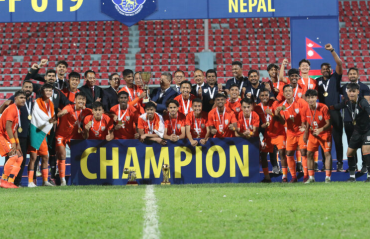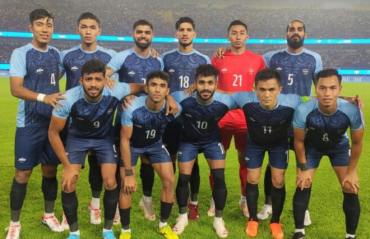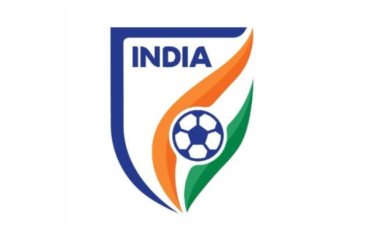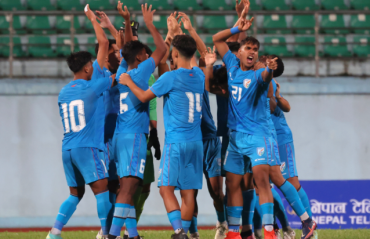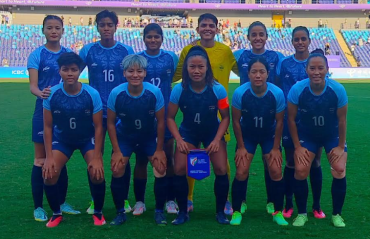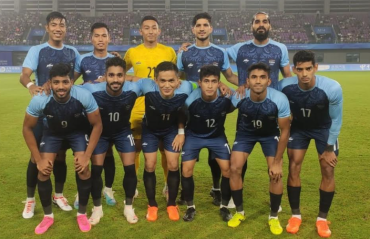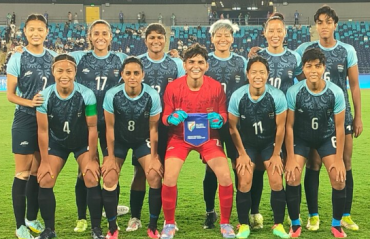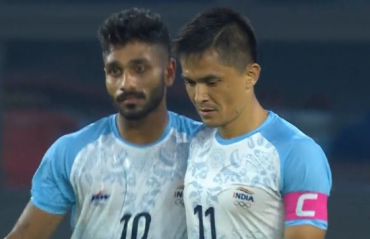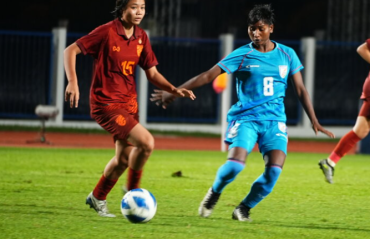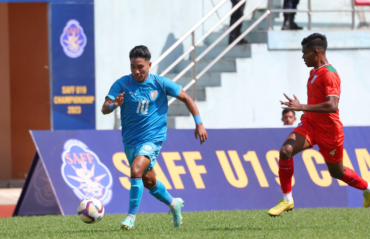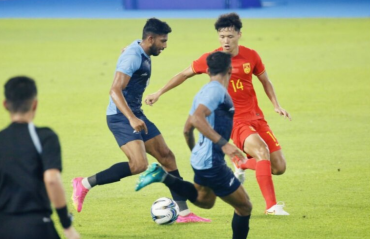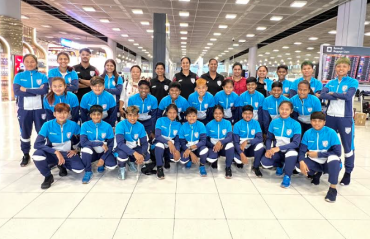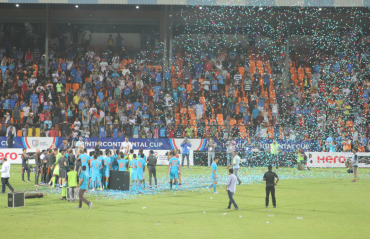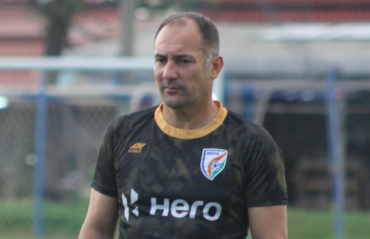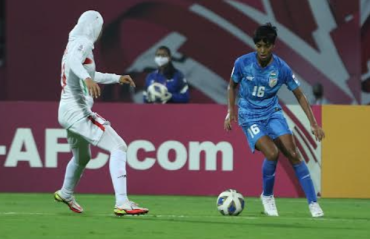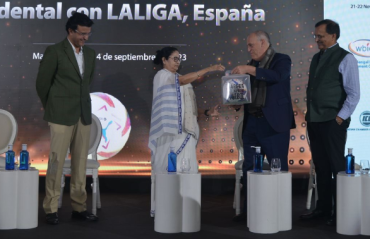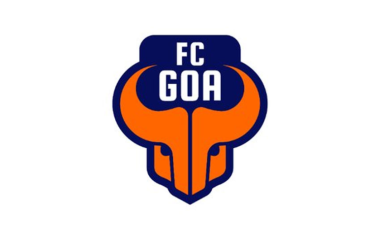4. Ranjit Bajaj's Passionate Speech
- By Chiranjit Ojha

- October 14, 2021

4. Ranjit Bajaj's Passionate Speech
When the floor opened for discussion, Valanka Alemao who was representing Churchill Brothers was the first to speak up,
"This comes more of a shocker to me, rather. Because to be practical, it's very difficult to get a sponsor with this kind of a roadmap ahead. Because we do not even know our fixtures of the league... there's no broadcaster."
She was, of course, referring to the situation I-League clubs were facing in October 2019 when they still did not know the fixtures of the upcoming season or which channel would show the matches, which left them with little chance of attracting good sponsors.
Ranjit Bajaj, owner of Minerva Punjab FC, picked up on this point, and began making his case in a passionate way that was almost confrontational,
"This is all wonderful and rosy sitting on that side of the table. But sitting here, this basically means, sadly, the shutting down of at least five more clubs which I can name today. And also the spots which have just been interchanged and given to ISL, they've been given, have historically been earned by these I-League clubs. So what basis was it given? Is it because they have more money than us, and that's why AFC has given them the spot? But I thought it was always about sporting merit. And yes, if any of those teams could beat our team... as a playoff, then they go and earn that spot, well and good. But if they can't compete with us on the field and the only way they can compete with us if they have bigger bank balances, if that's the way the basis of sports is going to be decided, then it should not be a World Cup... you should be calling Jeff Bezos and another five richest persons and tell them, bring your friends, we'll play a tournament and you'll get the World Cup. Why do you call countries and have qualifying matches and have countries like Iceland going up, because Iceland has a population of 300,000 and they have got no money power. But look at the story they've made. Same with Leicester. All these beautiful stories happened because of the small boys. And here, I mean there's no chance for us to go anywhere to survive... we have already been sidelined!"
He expressed his dissatisfaction with the telecast of I-League, which was previously done by Star Sports,
"Unfortunately our telecast partner is the owner of ISL as well. So they make sure that our matches are at 2 pm on a weekday. Dato, you've been to India. 2 pm, you will not go out in the street. And their matches are on the prime time weekends. So it's a direct conflict of interest. So when we tell our AIFF that let us handle the broadcast, we've got broadcasters willing to come and broadcast it for free, but they don't let go of it because they know that we will directly be competing with ISL."
Here, it's important to mention that Minerva Punjab's home matches were held at 2 pm because the ground in Chandigarh they had chosen as home venue did not have floodlights. After this meeting, even though the telecast rights of I-League subsequently went to 1Sports, MPFC's home matches continued to be held at 2 pm. However, Mr Bajaj did have a point about Star Sports wanting to reserve all the best prime time slots for ISL to ensure the matches of the competitions did not take place simultaneously.
He continued,
"We are AIFF's baby. And I don't understand how the top league of any country owned by a private person. I want one example in the entire FIFA, AFC, AFCON anywhere where the top league of the country is owned by a private person."
This was a contentious statement, and Mr Dato Windsor, at a latter time, challenged this,
"See, you have to understand that, they have an agreement... there are so many leagues that we've got outsourced... including Malaysia, they don't run the league. [FSDL] don't own the league. The league is given to somebody else to run. That's commercial. Everything is given to somebody to run. So you need to get your facts also right... because we have leagues totally independent."
Nevertheless, Ranjit Bajaj continued,
"The only way of getting into the league is by paying money. There is no sporting criteria involved at all whatsoever. In fact for the last three years all ISL clubs except Bengaluru and Jamshedpur, Bengaluru because they were from the I-League and they've been going up the right way, everyone has failed the licensing criteria."
Once again, it's necessary to correct some of what he said. About club licensing, he's right, that until 2017 not a single ISL team got a license because as a short private tournament they did not need to. In 2017-18, only Bengaluru FC applied and got both the national and club licenses. But since Bengaluru FC were an I-League club that had just moved to the ISL, Mr Bajaj's statement would still be correct till this point. But from the 2018-19 season the situation change. That year 5 ISL teams acquired the club licenses: Chennaiyin FC, Bengaluru FC, NorthEast United, FC Goa and ATK FC. Next season, again, 5 ISL teams cleared the licenses: Chennaiyin FC, Bengluru FC, Jamshedpur FC, FC Goa and ATK FC.
Going back to the speech, he continued,
"So there is no way they can compete with us on the field, off the field except with the money.... And being honest with you, all ISL clubs sitting here are losing money. In fact they must have lost 70 to 80 to 100 crores in the last 5 years. And, we are losing money. The only people who are making money right now are the marketing partners. Because not only do they get franchise fees from each ISL club, which is more than 160-170 crores, plus they get revenue from Star Sports which is enormous and it's going to go up. Nowhere in the world the broadcaster owns the league. The actual money everywhere in the world, all clubs make money because they have broadcasters' revenue coming in. Here this will never happen. Because the broadcaster owns the league. And unfortunately where I-League is concerned, they own us as well. Because they make sure that we die."
At this point, Devang Bhimjyani, a senior FSDL representative who had served as the Interim CEO, spoke out against him for the first time,
"I just want to correct a fact... FSDL does not make money... the math you mentioned is not correct... I just want to state on record that FSDL does not make money like you just stated."
A little while later, Priti Srivastava, another senior representative of FSDL in the meeting, opposed Mr Bajaj's characterization of FSDL's deal with AIFF,
"You know what were the circumstances [The deal happened]?... We actually bailed out I-League and AIFF. Because they didn't do anything. I-League was to be shut. And then we went to Zee... We didn't create ISL, we came for I-League. We worked with I-League. We bailed out I-League... and [ISL] is not owned by a person. Please. It's owned by companies... I'm sure you have grudges. I can offer personally to sit with you... so I can give you the background... I think now it's no point going back. We should look forward. And we should be more participated and we are ready to have a dialogue."
Kushal Das, too, backed her up towards the end of the meeting,
"What Priti said was exactly true. If we did not find the partner that time, Indian football would have shut down. You know, that year, in 2010, the I-League was not broadcast. You know that? It was some matches in a regional channel... nothing else. Next year also we had a huge problem finding a broadcaster. So we have to acknowledge and accept the fact that money is very important... without money there is no chance of improving Indian football or finding a sustainable model... Let us not undermine the money part and just talk about all this, I mean, sporting merit is important but even in sporting merit you need money. To develop players you need money. To develop a youth development programme you need money. Why are many of the clubs failing the licensing? Because they are not able to spend that money on youth development. They are not able to spend the money on infrastructure. That's why they are failing. So please do not undermine the value of money. "
The AIFF Genral Secretary also further elaborated on the issue Indian football faces regarding making money from TV broadcasts,
"Television revenue, for that matter, unfortunately for a 90 minute football game, the Indian television revenue is based on advertisements. Not from subscription. So the subscription is very less, whereas the advertisement revenue is the main stream. And for a football match right now in India, unlike a cricket match, the ability to have advertisement revenue is very very limited. We cannot advertise during a game, it's only prior to the game, half-time or after the game. So that is a significant problem which we are facing. And that is exactly the reason why we could not get a broadcaster and we had to get a broadcaster who was a financial partner. Because this is a reality."
Returning, once again, to Ranjit Bajaj's statement, he echoed Valenka Alemao's concerns about the dissimilarities seen in the ways I-League and ISL's fixtures were released,
"The ISL is going to start on the 20th. They have their entire fixture for the next three years. We are going to start in 20 days. We don't know when our matches are. We don't know whether they are going to be telecast or broadcast. When we go and tell them that we'll find you a broadcaster who's willing to broadcast you for free, they don't let them go there... so end of the day this is money ruling over sporting merit."
Mr Kushal Das responded,
"Let's get to the broadcasting fact. If you can find a broadcaster, and we've been trying, we're happy to give it to another broadcaster. Right? Absolutely. But the fact of the matter is that we have spoken to a few broadcasters, they are not at this point of time willing to take it. That's a fact of the matter. But if you can find somebody, there's no problems at all. No problems at all... secondly... I accept your fact that everybody is losing money right now. This is the problem of Indian football, a sustainability model has to be found. We have to all work together to find that model. But at this point in time, I think whatever is happening, is probably the best method to find that solution. It may work, it may not work. But at least let's give it a try."
And he did. Many have credited Ranjit Bajaj with playing an important role in helping I-League sign their new broadcast deal.
In December 2019, just weeks after this meeting, the I-League CEO Sunando Dhar described the I-League broadcast scenario at the India Football Forum event in a way that directly contradicted the version presented by Mr Kushal Das,
"When the I-League clubs approached AIFF saying they would want to look beyond Star, because they thought that match timings and some other issues... they were not getting that flexibility with Star. Obviously, we have to thank FSDL for giving us the permission to look beyond, outside, the agreed terms. The best thing for me was that the interest we saw from the market. Obviously DSport [Later 1Sports] was there. There were many other networks also, equally keen to take up the rights for I-League. And it's not the rights for one year, all were willing to and fighting to take the rights for three years, which was fantastic to see in the market. Earlier obviously we didn't venture out in the market but when we did, this interest was fascinating for us to see.









